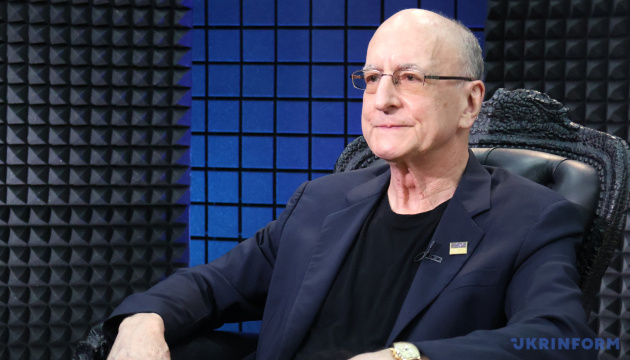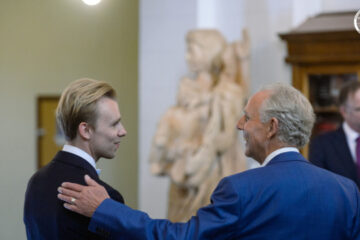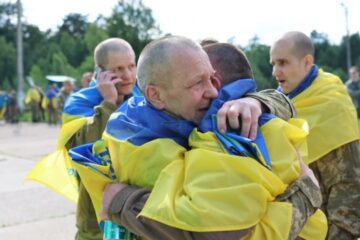On February 28, 2022, while Russian troops were advancing toward Kyiv, trying to break through the capital’s defenses, Giuseppe Verdi’s “Don Carlos” was to be staged at the Metropolitan Opera in New York. But right before the start of the show, the audience on the other side of the Atlantic witnessed a choir rise and perform the Ukrainian anthem.
That was just one of many gestures in support of Ukrainians by Peter Gelb, the manager of the world’s leading music center. Immediately after the Russian attack, he announced the severance of all relations with artists who supported the war against Ukraine. Thanks to him, the Metropolitan Opera was the world’s first cultural institution to condemn the Russian invasion.
During his stay in Kyiv, Ukrinform spoke with the general manager of the Metropolitan Opera about why he could not stand aside from Ukraine, his future projects to support our culture, and the role of art in times of war.
I HAVE NO PROBLEM DEFENDING MY POSITION ON UKRAINE TO ANYONE
– The Metropolitan Opera was one of the first leading cultural institutions to publicly support Ukraine after the full-scale invasion. What was the decisive factor in taking this stance?
– First, I regret that our support for Ukraine only began with the invasion. It really should have started with the war earlier. It was my ignorance in not doing it sooner. But once the invasion commenced, the idea that the Putin regime was going to try to destroy Ukraine made it very clear that the only action anyone who has a moral sense of right and wrong could take was to support Ukraine.
The support began within a few days of the invasion. The first performance the Met had scheduled after the invasion was the opera Don Carlo by Verdi, but before the beginning, I had the cast of the chorus come on stage and sing together with the orchestra of the Ukrainian National Anthem to send a signal to our audience and the world that the premier performing arts institution in America was taking a strong stance.
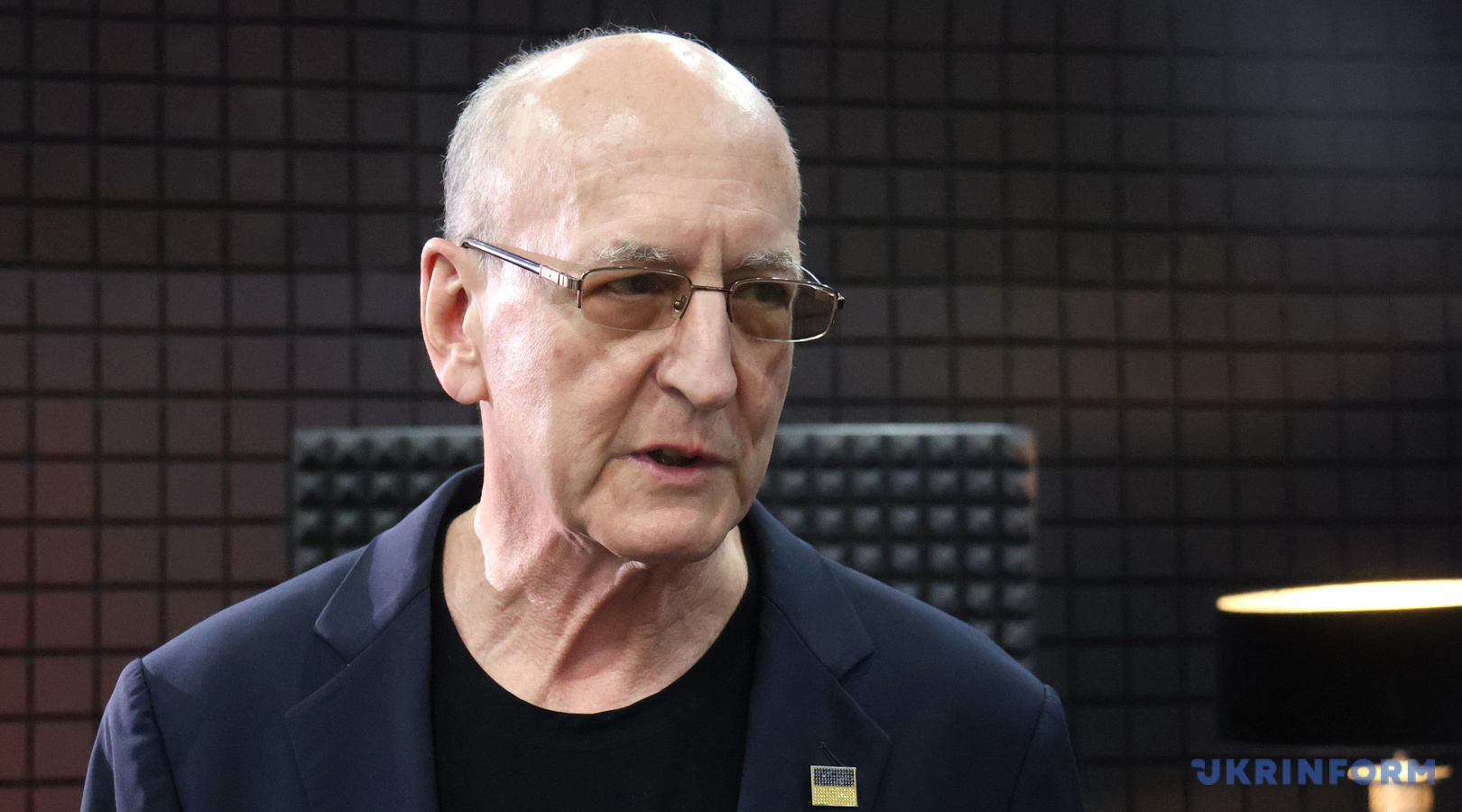
– Your active position about Ukraine has caused both admiration and criticism. Have you ever happened to face pressure or open disagreement to this? How do you react to this?
– I have been working in the performing arts since I was a teenager and have had leadership positions since I was 30 years old. I have always faced criticism. When you take strong positions, there is no way that everyone can agree with you.
But the decision to support Ukraine the members of the Metropolitan Opera Company approved. We have 2,000 to 3,000 people working at the Met every day – the employees, the artists of the Met. I think it is fair to say that almost all of them, if not all of them, agreed with me.
When you take a right position, it is very easy to defend. There are some situations in the world where there is a certain ambiguity or things are not so clear, whether each side could have some right argument. But when the Putin regime is trying to destroy a nation, its sovereign right to exist, its culture, there is no right or wrong. There is only what is right, which is to support Ukraine. I have no problem defending my position, and I do it, if necessary, to anyone.
However, it was not just a question of playing the national anthem. It included cutting all the relationships the Met had professionally with Russian cultural institutions.
Two days before the invasion, I was in Moscow – the last time I will ever be there until Ukraine wins the war – to attend the final dress rehearsal of a co-production between the Metropolitan Opera and the Bolshoi of the Wagner opera Lohengrin. But after hours, when I returned to New York, the invasion began. I immediately contacted Vladimir Urin, who was the director of the Bolshoi at the time, and said: “I’m very sorry, but our relationship is over. We are not going to work with you anymore.” I also immediately gave our leading star, Anna Netrebko, the choice of either disavowing Putin and the war, or being fired by the Metropolitan. She chose, and we fired her. Later on, she announced she was against the war. But she only did this to show that she should be given away back, if not the Metropolitan, other opera companies.
But I very quickly cut all ties with cultural institutions in Russia and any artists who publicly were connected with Putin or supported him.
– But Russians use their opera singers, artists, athletes, anyone to promote their authoritarian state. If anyone gets recognition worldwide, it is a win for Putin’s regime. Do you agree with that and do artists in the US see it this way?
– First, I felt from the Metropolitan Opera perspective that a slightly more nuanced position, which was that I did not believe that great Russian composers like Tchaikovsky or Shostakovich, who had died many years ago, should be held hostage by Putin. I also believed Russian artists who were not publicly supporting Putin should have a chance to perform.
Today, I feel somewhat differently. The American government’s position has moved away from support of Ukraine and is ambivalent. Putin has taken a much more aggressive position in terms of increasing his attacks, escalating the war to another level. So, I now feel uncomfortable with the idea of letting Russian artists who are actively working in Russia to continue to work at the Met.
I have not made this change yet, but I am thinking seriously about it now, because there are great Russian artists who have left Russia and live and work outside of it. Those are the artists I would like to perform at the Met, not the ones who are staying and working at the Bolshoi or the Mariinsky. You will see this position changing at the Met in the coming season.
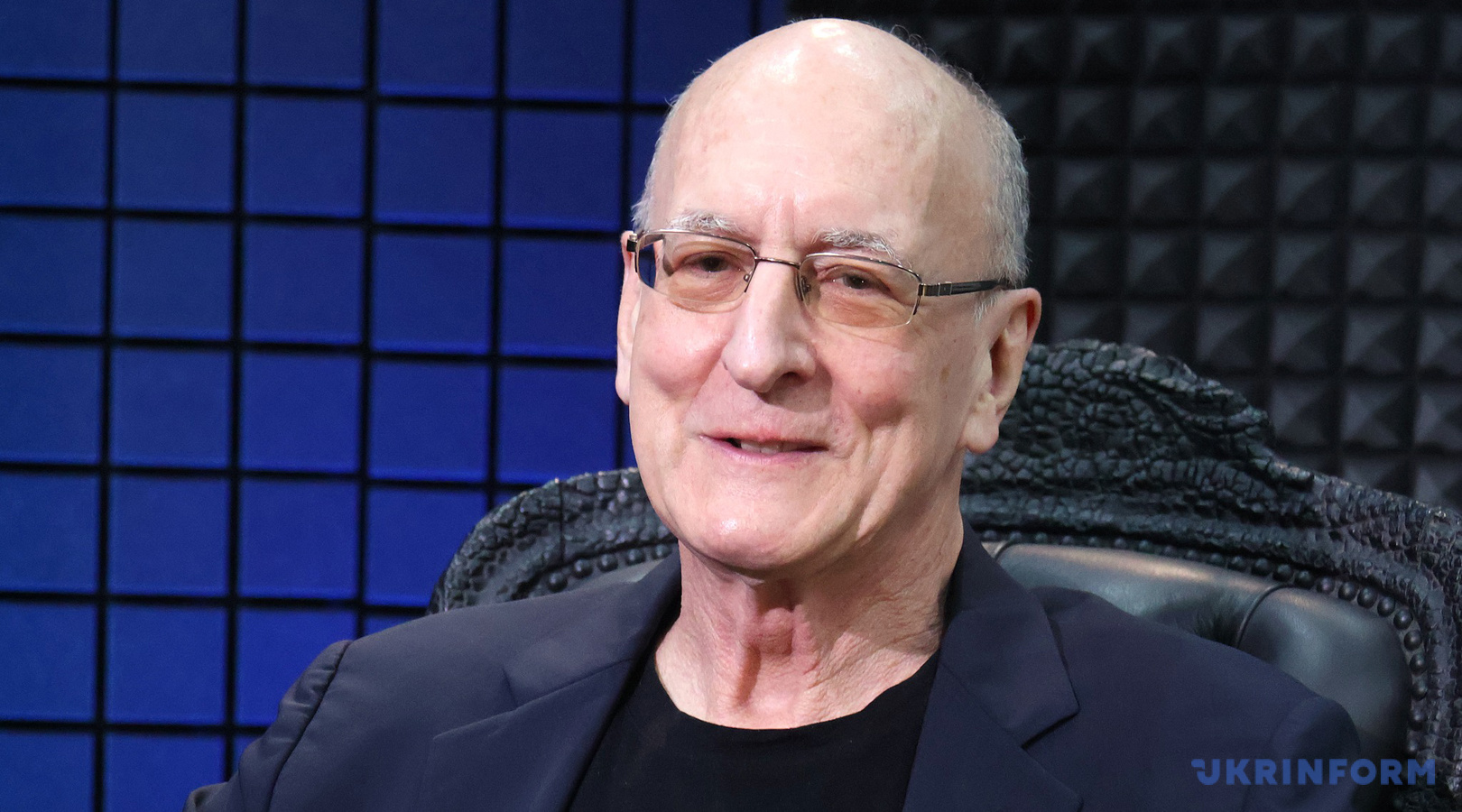
SOMEBODY WHO THINKS ART IS NOT POLITICAL IS NAIVE
– You obviously do not get behind the people who claim that art and culture should remain non-political, but what would you say to those who think this way?
– I would say they are wrong. Art and culture is political, and the country that has made it the most political is Russia. Always! In the 80s, I have been working on cultural exchanges in Russia and China when President Reagan and Gorbachev were negotiating nuclear detente, and they agreed to begin with a cultural exchange. I was responsible for the first step in it, and I was the manager of Vladimir Gorovets, the most famous pianist in the world at the time, to rearrange for his first time back in Russia.
Art is a symbol. It has always been connected with politics. If we want to live in a civilized world, art is an expression of civilization. It is also a tool of propaganda. Russia has always used its great art of the past, its ballerinas, its musical stars as symbols of Russian cultural might.
One of the ways to support Ukraine for me was to help create the Ukrainian Freedom Orchestra. It is very important in these difficult times that Ukrainian artists are given a chance to show to the world what they have to offer. I am very proud of my wife, Keri-Lynn Wilson, who is the conductor inside Ukraine of the Kyiv Kamerata, which specializes in featuring only great contemporary Ukrainian music, from Skorik to Stankovych.
It is important both to show the people of Ukraine the world outside supports them at a time when they must feel very isolated and abandoned, to know that they are not abandoned. And it is very important to demonstrate to audiences around the world the power of Ukrainian art and Ukrainian culture.
One of the reasons why I am here in Ukraine this week is to meet with the First Lady of Ukraine, Olena Zelenska, once again to discuss different cultural projects that can help Ukraine.
So, to somebody who asks the question, art is not political, I would say they are very naive and do not understand that art is political.
– Do you think Ukrainian opera and music receive sufficient recognition around the globe? What Ukrainian works or composers do you think deserve special attention?
– I myself have learned a lot about Ukrainian composers and art through hearing performances if not for the invasion. But there are many beautiful and moving works of Ukrainian art. Some I mentioned before, like Skoryk and Stankovich. I heard a wonderful piece by composer Olexander Rodin the other day.
Two years ago, we commissioned the opera The Mothers of Kherson, which is an example of art being able to tell a story beyond the news cycle, by Ukrainian composer Maxim Kolomiiets. The Metropolitan Opera initiated it. The libretto was by American playwright George Brant. It is a story based on the story of two real mothers who were in Kherson, which the Russians occupied, at the beginning of the invasion.
They are desperate to protect their teenage daughters because Russian soldiers could rape them. The schoolteacher in Kherson told them about an opportunity to make them a vacation in the Crimea.
After a few weeks, their daughters do not return, and with the help of the Save Ukraine organisation they go on this extensive odyssey into Poland, Belarus, Russia and into the Crimea to save their children.
There are so many things happening everywhere in the world it is hard to keep track of. I am always upset when Ukraine is being bombed, and it is not the first item in the newspaper or television. But the news cycle comes and goes, and the art stays forever. This artistic work will forever tell the story and demonstrate the power of Ukrainian art and this human tragedy.
Last week or two, we provided a small excerpt of this opera to the New York Times so they could put it in their newspaper. This summer, the composer, Maxim Kolomiiets – even though he’s still completing the opera – is taking a segment, making a suite from the opera that will be performed as the opening piece on the Ukrainian Freedom Orchestra program around the world. When the opera finally is performed in its full entirety in Warsaw next year, and then at the Metropolitan Opera, we will broadcast it into movie theatres around the world. Millions of people will see it.
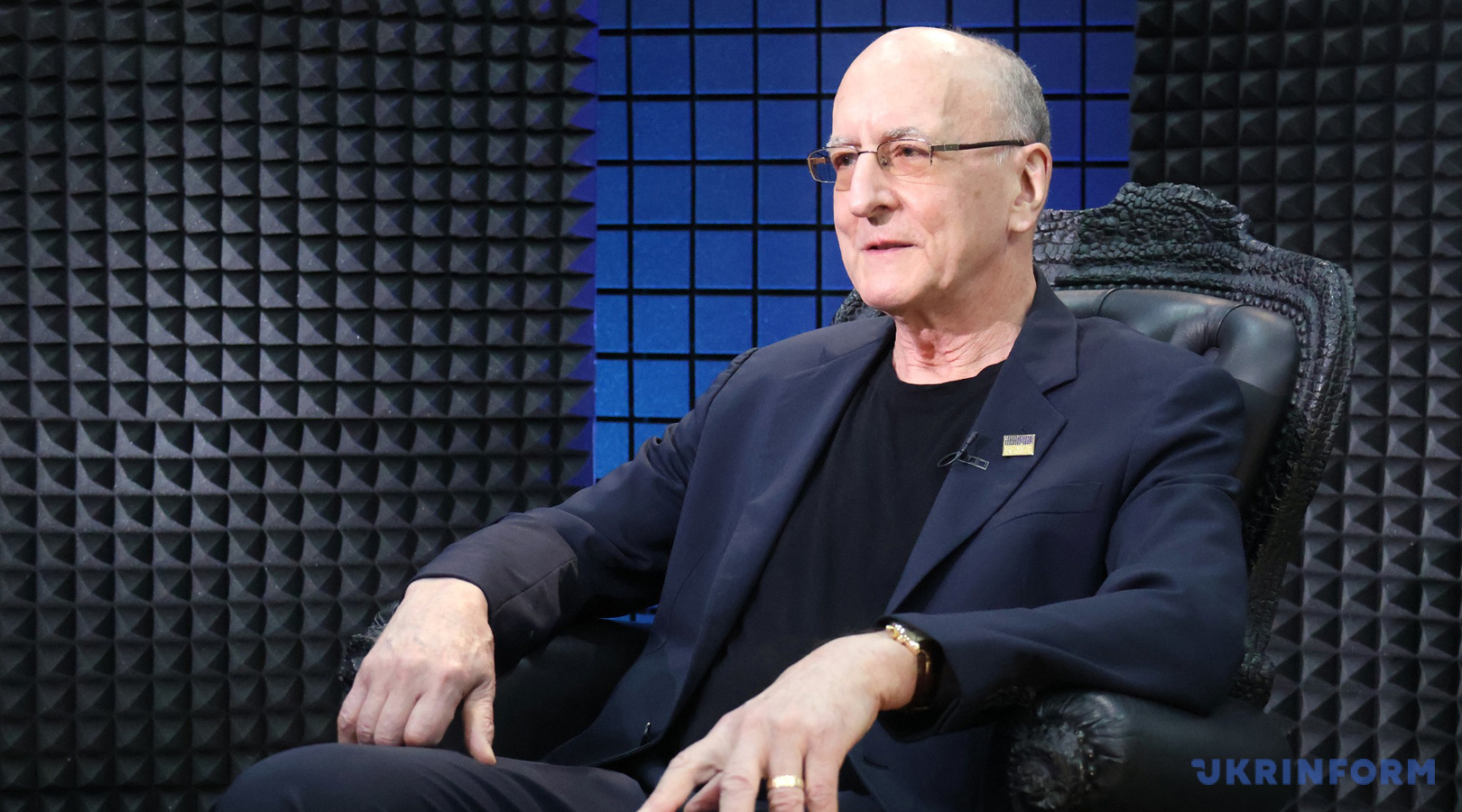
WORLD HEADS TO DARK AGES. ART CAN HELP STEER IT IN RIGHT DIRECTION
– Do you think we see the mission of art changing? How would you shape the mission of art today?
– I work in opera, which always has the risk of losing an audience because it becomes older. We have to be constantly renewing ourselves and telling stories people today can relate to. At the Metropolitan Opera, we are always putting on new operas. At the beginning of the season, we had an opera about a female Air Force pilot who became a drone operator and who suffers the guilt of seeing the collateral damage of drone attacks. We have an opera opening our season next year called The Amazing “Adventures of Kavalier & Clay”. It takes place during World War II and is about the forces of democracy against fascism.
Many people admire Bruce Springsteen, a very famous American pop star who is spending his time talking about what is wrong with the American government and fighting for democracy.
I think artists with big followings, pop or classical artists, have an opportunity and a responsibility in a world that is more troubled than ever before, particularly in Ukraine, to speak out, to use their art, to use their platform, to use their audience, to present the truth. Otherwise, we will go back to the dark ages and become primitive people just trying to kill each other, which seems like a direction the world is heading. I think art can help steer it in the right direction.
– During your visit you have said about your origins in Ukraine. Your ancestors were from Carpathian village Velyki Komiaty, and you managed to visit it. Tell us, please, how it was for you and what you felt out there?
– I grew up in New York City. My father was a very moral man and a famous newspaper man. He started as a copy boy, the lowest position at the New York Times, and spent his entire career at the New York Times, rising to become the top managing editor. If I have a strong moral compass, it is because of him. He believed in the difference between right and wrong and in a newspaper man’s responsibility to tell the truth to the readers.
One thing he was not accurate about was my origin. He believed his parents came from the same Carpathian Mountains, but they never met there. They met in the Lower East side of Manhattan, where many Jewish immigrants lived. He believed they were Hungarian. My grandmother was living with us. She was always preparing Hungarian dishes like goulash and paprikash. So, I always thought I was half Hungarian.
The governor of the Transcarpathia explained to me in Uzhhorod that the history of this village goes back to the 14th century. It has been as other town in this region, like a pin-pong ball, going back and forth to the different country. So, it was once Hungarian but also Czech, and since the 1950-s, the Soviet Union acquired it as part of Ukraine.
I am not sure if this makes me Ukrainian because my grandparents left in the early 1900-s, when it was not a part of Ukraine. But the governor says I am Ukrainian.
If it is so, I am half Ukrainian and I am proud of it. It will not change my position in terms of supporting Ukraine but it is good to know I have Ukrainian blood in my veins. Nothing could make me happier than to be Ukrainian.
Ivan Kosiakin, Kyiv
Photo: Pavlo Bahmut
Source: Peter Gelb, General Manager of the Metropolitan Opera

